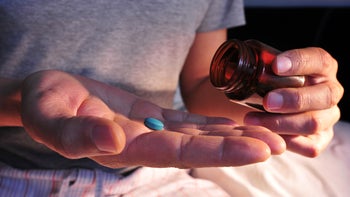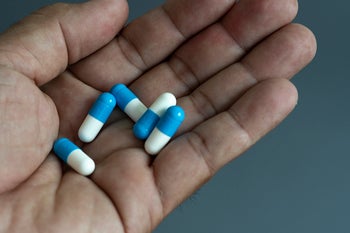
Diabetes and Erectile Dysfunction (ED): How Are They Linked?
Key takeaways:
Diabetes is a common cause of erectile dysfunction (ED).
The treatments for ED (like Viagra) are the same whether you have diabetes or not.
When you have diabetes, ED can be a warning sign that you are starting to have health complications from diabetes.
Access savings on related medications
Table of contents
People with diabetes have a higher risk for erectile dysfunction (ED). In fact, ED is more than three times as likely in men with diabetes than in men without it.
People with diabetes also have a higher risk of cardiovascular (heart and blood vessel) diseases. And it boils down to the same reason — over time, high blood sugar levels can damage the blood vessels and nerves that supply key organs and structures in the body. That’s why it’s so important to keep your blood sugar within target range. Healthy nerves and blood vessels are what make it possible to have — and sustain — an erection that’s satisfying enough for sex.
But there are other reasons why people with diabetes are more likely to have problems with erections. Stress, depression, excess weight, high blood pressure, and certain medications can all cause impotence alone. Together, these factors further increase the likelihood of ED.
Fast, affordable ED treatment from GoodRx
Build a personalized treatment plan and get erectile meds delivered discreetly. Subscriptions start at just $18/mo.

GoodRx is NOT insurance. Cancel anytime. GoodRx Health information and resources are reviewed by our editorial staff with medical and healthcare policy and pricing experience. See our editorial policy for more detail. We also provide access to services offered by GoodRx and our partners when we think these services might be useful to our visitors. We may receive compensation when a user decides to leverage these services, but making them available does not influence the medical content our editorial staff provides.
How does diabetes affect a man sexually?
Men living with Type 2 diabetes can face several medical and mental health challenges. Many men worry about the possibility of diabetes-related impotence, or the inability to perform sexually, to their satisfaction.
Sexual problems that diabetes can cause include:
Delayed or absent ejaculation and orgasm
Low libido (reduced sexual desire or interest)
Retrograde ejaculation (when semen goes into the bladder instead of outside the body)
ED (the inability to achieve and maintain an erection hard enough for sexual intercourse)
Can diabetes cause erectile dysfunction?
Diabetes is a risk factor for ED. This means that diabetes can lead to damage in your body that may make it more likely for you to have ED. Some people with diabetes are more likely to have ED, especially those who:
Have other diabetes-related problems, like peripheral neuropathy or diabetic retinopathy (eye changes related to diabetes)
Have had diabetes for a long time
Have blood sugar levels or A1C readings that are consistently higher than your target range
When a person with diabetes has erectile dysfunction, it’s a sign that they may be starting to have long-term complications of diabetes. It’s a good reason to get your heart, kidneys, eyes, and feet checked out. If your erections are affected, there’s a good chance these other organs could be affected too.
Why do men with diabetes have erectile dysfunction?
To understand the relationship between diabetes and ED, it helps to know the mechanics of an erection. Getting, sustaining, and ending an erection is a complex process involving your mood, nerves, blood vessels, muscles — and much more. Diabetes can affect every part of this process. Here’s how.
Damage to blood vessels (microvascular disease)
When blood sugar levels run high over long periods, this can damage the small blood vessels that supply the penis. This is called microvascular disease. It means that the muscular walls of small blood vessels aren’t working properly, which reduces the amount of blood flow.
Damage to small blood vessels in the penis means that the natural process of getting and sustaining an erection doesn’t work as well. The risk of ED is higher in men with long-standing diabetes and those with blood glucose levels that are frequently high.
You may be wondering if high blood pressure can cause ED. In men with both diabetes and high blood pressure, the high blood pressure can also damage the blood vessels in your penis, and increase the likelihood of ED.
Damage to nerves (diabetic neuropathy)
High blood sugar levels can also damage nerves. Since nerves are key to the process of getting and maintaining an erection, any damage to the nerves in your penis can cause erection problems.
Abnormal fat and cholesterol levels
Having unhealthy fat and cholesterol levels — specifically, high low-density lipoprotein (LDL) cholesterol, low high-density lipoprotein (HDL) cholesterol, and high triglyceride levels — increases the risk for ED by contributing to blood vessel damage.
Heavier weight
It’s common for people with diabetes (especially Type 2 diabetes) to have a larger body size. And having a lot of body fat, especially around your belly area, is linked to ED. It’s also common for men with larger body sizes to have lower testosterone levels, which can also play a role in erection problems (more on this below).
Low testosterone levels
Diabetes is also linked to lower testosterone levels (low T). In fact, as many as 50% of men aged 45 and older with Type 2 diabetes have low testosterone levels. Testosterone affects your erections in many ways, from desire and arousal to the erections themselves.
The relationship between testosterone, diabetes, weight, and cholesterol is complex. To further fuel the vicious cycle, low testosterone can cause abnormal fat and cholesterol levels. Treatment with testosterone replacement, like gels, patches, or injections, may help.
Mood and mental health struggles
People with diabetes are more likely to have mental health struggles than those without diabetes. In fact, people with diabetes are twice as likely to have depression as those without diabetes. This often comes from the combined stress of managing a chronic disease, worrying about the future, and experiencing poor health. And guess what? Depression, anxiety, and antidepressant medications can all lead to ED.
It’s not always clear which comes first — ED or depression — but either way, it’s often hard to resolve ED without addressing mental health.
Medication side effects
Many men who have diabetes take multiple medications to reduce their risk of heart problems or complications from diabetes. Some of these medications, such as blood pressure medications and antidepressants, may also contribute to ED.
Other causes of ED
Aside from diabetes, other medical conditions and behaviors can make ED more likely. We’ve already discussed some, but here’s a list of the top risk factors for ED, other than diabetes:
Age
Cardiovascular disease (CVD)
High blood pressure
BMI over 29
Abnormal fat and cholesterol levels
Smoking
Relationship struggles
Quiz: Is it erectile dysfunction?
How can someone with diabetes overcome erectile dysfunction?
Ready for some good news? Over 95% of men can overcome ED with the right treatment.
Since patients with diabetes often have many other health issues to think about, treatment is never a “one-size-fits-all” approach. Nonetheless, there are multiple options you can consider, including:
Lifestyle changes
Medications
Vacuum devices
Implants
Let’s explore some of these options in more detail.
Lifestyle changes
Treatment of ED in people with (and without) diabetes starts with lifestyle changes. These changes have several benefits. Not only do they reduce blood glucose levels, but they also address many other factors contributing to ED in men with diabetes. For example, these changes improve heart health and well-being. There are key changes you can make to improve your ED. For example, you can:
Quit smoking
Lower your cholesterol
Eat a Mediterranean-style diet
Increase the amount of physical activity you get
Take steps to reduce weight
Learn stress-management techniques
There’s good evidence that lifestyle changes can improve mild ED. For more serious ED, lifestyle changes usually need to be combined with medication (more on that below).
Medications
If your healthcare professional determines that you have ED, they may prescribe one or more medications to help. Most of these work by helping to increase blood flow to your penis. ED pills are by far the most common. The injections tend to be used as second-choice treatments for people who have not had good results with pills. Here are some commonly prescribed medications:
Oral pills: Sildenafil (Viagra), tadalafil (Cialis), and vardenafil (Levitra) are oral (pill) medications that help with erections by increasing blood flow to the penis. Each of these drugs works well, but which works best for you will depend on your personal circumstances.
Penile injection: Alprostadil (Caverject) is a medicine that is directly injected into your penis to cause an erection. It works more than 70% of the time. But because this medication has to be injected into your penis, most men prefer trying an oral medication before using this. Unlike the medications above, Caverject does not require you to be sexually stimulated to cause an erection and will generally work right away.
Urethral injection: Alprostadil (Muse) is a medication that is inserted up into the urethra, 5 to 10 minutes before sex. It will cause an erection that can last about an hour.
Mechanical treatments
Diabetes can cause problems with blood flow to your penis. There are devices that can help increase blood flow, especially if medications don’t work for you. These include vacuum-assisted erection devices that pull blood into your penis, making it firm and erect. These devices work for about 2 out of every 3 men.
Another type of treatment is prosthetic surgery. In this procedure, a prosthesis (or artificial part) is inserted into your penis, which can be inflated when you want to have an erection. Unlike medications, these devices are a one-time expense, though the decision ultimately depends on personal preference.
Can erectile dysfunction caused by diabetes be reversed?
With careful blood sugar control and treatment of other factors that contribute to ED, it’s possible to stop ED from happening or from getting worse. But existing damage to nerves and blood vessels caused by diabetes can’t be reversed.
Tips for preventing irreversible damage requires you to manage:
Lifestyle changes
Blood sugar levels
Mental health
Relationship challenges (if needed)
Will lowering your blood sugar help with ED?
High blood sugar is one of the main causes of erectile dysfunction in people with diabetes. Keeping your blood sugar levels within a healthy range will prevent further damage — both to your penis and also to the rest of your body.
There’s also increasing evidence that some medications may be helpful in improving sexual function in people with diabetes. These medications work by balancing the careful interplay between glucose levels, weight, and testosterone levels. Medications that may help include:
Glucagon-like peptide-1(GLP-1) agonists, like Byetta, Victoza, Trulicity, or Ozempic
Dipeptidyl peptidase-4 (DPP-4) inhibitors, like Januvia or Tradjenta
Sodium-glucose cotransporter-2 (SGLT2) inhibitors, like Invokana, Farxiga, or Jardiance
Does metformin cause erectile dysfunction?
Whether metformin causes erectile dysfunction is a subject of debate. Some studies suggest that metformin use is associated with lower testosterone levels in men with Type 2 diabetes. And some researchers have found that metformin is not only associated with low T, but also with decreased sexual desire and ED.
On the other hand, other researchers believe that metformin may improve vascular function and may be useful in treating ED. Another study showed that metformin might increase the production of nitric oxide in the penile blood vessels, similar to the way Viagra works.
There aren’t any long-term controlled studies looking at the sexual effects of metformin in large numbers of men with Type 2 diabetes. Until those types of studies give us a clear answer, you should talk to your healthcare professional. Together, you can weigh the potential risks and benefits to come up with a treatment plan that’s best for you.
The bottom line
Erectile dysfunction is common in people with diabetes. Fortunately, it’s almost always treatable. Medications can help, but they work best when combined with lifestyle changes and diabetes management. This could mean improving your blood sugar levels, weight, and overall mental and physical health.
If you’re dealing with ED, don’t be shy about talking to a healthcare professional. They can help you manage your diabetes, and give you the tools you need to prevent — or treat — erectile dysfunction.
Why trust our experts?



References
Al-Kuraishy, H. M., et al. (2016). Erectile dysfunction and low sex drive in men with type 2 DM: The potential role of diabetic pharmacotherapy. Journal of Clinical & Diagnostic Research.
American Diabetes Association. (n.d.). Health & wellness: Sex and diabetes.
Anderson, R. J., et al. (2001). The prevalence of comorbid depression in adults with diabetes: A meta-analysis. Diabetes Care.
Bahar, A., et al. (2020). Sexual dysfunction in men with type II diabetes. Caspian Journal of Internal Medicine.
Centers for Disease Control and Prevention. (2022). Manage blood sugar.
Centers for Disease Control and Prevention. (2022). Diabetes and men.
Corona, G., et al. (2019). Male and female sexual dysfunction in diabetic subjects: Focus on new antihyperglycemic drugs. Reviews in Endocrine and Metabolic Disorders.
Defeudis, G., et al. (2021). Erectile dysfunction and diabetes: A melting pot of circumstances and treatments. Diabetes/Metabolism Research and Reviews.
Dhindsa, S., et al. (2010). Testosterone concentrations in diabetic and nondiabetic obese men. Diabetes Care.
Gupta, B. P., et al. (2011). The effect of lifestyle modification and cardiovascular risk factor reduction on erectile dysfunction: A systematic review and meta-analysis. JAMA Internal Medicine.
Hu, Y., et al. (2021). Rapid changes in serum testosterone in men with newly diagnosed type 2 diabetes with intensive insulin and metformin. Diabetes Care.
MedlinePlus. (2023). Retrograde ejaculation.
Patel, J. P., et al. (2017). Effects of metformin on endothelial health and erectile dysfunction. Translational Andrology and Urology.
Penson, D., et al. (2004). Erectile dysfunction in diabetic patients. Diabetes Spectrum.
Rowland, D., et al. (2010). Disorders of orgasm and ejaculation in men. Journal of Sex Medicine.
Shindel, A. W., et al. (2021). Sexual dysfunction in diabetes. Endotext.
Skrypnik, D., et al. (2014). Obesity — Significant risk factor for erectile dysfunction in men. Polski Merkuriusz Lekarski.
Zhang, K., et al. (2017). Effects of testosterone supplementation therapy on lipid metabolism in hypgonadal men with T2DM: A meta-analysis of randomized controlled trials. Andrology.

























